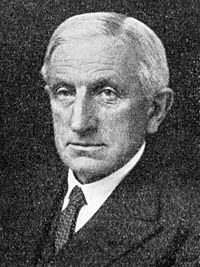Wilfred Trotter facts for kids
Quick facts for kids
Wilfred Trotter
|
|
|---|---|
 |
|
| Born | 3 November 1872 Coleford, Gloucestershire, England
|
| Died | 25 November 1939 (aged 67) Blackmoor, Hampshire, England
|
| Known for | Neurosurgery herd instinct |
| Awards | Fellow of the Royal Society |
| Scientific career | |
| Fields | Surgery social psychology |
Wilfred Batten Lewis Trotter, FRS (1872–1939) was an important English surgeon. He was a leader in the field of neurosurgery, which is surgery on the brain and nervous system. He was also famous for his ideas about social psychology. His most well-known idea was the "herd instinct". This idea suggests that people, like animals, tend to follow the group. He first wrote about this in 1908. Later, he wrote a famous book called Instincts of the Herd in Peace and War. This book was an early classic in understanding how large groups of people behave. Trotter believed that being part of a group (gregariousness) was a natural instinct. He studied how animals like beehives, flocks of sheep, and wolf packs behaved.
Contents
Life of Wilfred Trotter
Wilfred Trotter was born in Coleford, Gloucestershire, England, in 1872. When he was 16, he moved to London to go to college. He was a very good medical student. He decided to become a surgeon. In 1901, he became a Surgical Registrar at University College Hospital. He became an Assistant Surgeon there in 1906. After getting his medical degree, he started his own medical practice.
Trotter also enjoyed writing. He was interested in science and philosophy. In 1908, he published two papers about "herd mentality". These papers were early versions of his more famous book.
His Work and Honors
Wilfred Trotter worked as a professor of surgery at University College Hospital in London. From 1928 to 1932, he was an Honorary Surgeon to King George V. This was a special role, meaning he was a surgeon to the king.
In May 1931, he was chosen as a Fellow of the Royal Society. This is a very high honor for scientists in the UK. In 1932, he became the President of the Association of Surgeons. Later in his life, he became a professor and director of the surgical unit at University College Hospital. He also started writing more books. In 1938, he received the Gold Medal of the Royal Society of Medicine.
Trotter passed away in Blackmoor, Hampshire, in 1939. Two years after he died, a book called The Collected Papers of Wilfred Trotter was published. It contained his final essays.
Connections to Other Thinkers
Wilfred Trotter was also the surgeon at University College London where Wilfred Bion worked. Bion later became famous for studying groups and training as a psychoanalyst. Bion's wife, Francesca, wrote that Trotter greatly influenced Bion's work on how groups interact.
Edward Bernays, who wrote the book Propaganda, also mentioned Trotter in his writings. Bernays was the nephew of Sigmund Freud.
Trotter met Sigmund Freud several times. Freud was a very famous psychologist. According to Ernest Jones, who wrote about Freud's life, Trotter was one of the first people in England to understand how important Freud's work was.
Major Works and Ideas
Wilfred Trotter's popular book, The Instincts of the Herd in Peace and War, looks at how groups of people behave. It explores how large numbers of people can be influenced because of a natural tendency to follow the group. In this book, he helped make the idea of an "instinct" popular in English. This instinct, first described by French sociologist Gustave Le Bon, suggests that the group's will can be stronger than an individual's will.
Trotter started writing about "herd mentality" as early as 1905. His papers on the topic were published in 1908 and 1909. Many people believe his ideas were a big step forward in understanding group behavior. This was long before studying group behavior became important in many areas, like how people work together in a workplace or how marketing works.
See also
- Crowd psychology
- Ernest Jones
- Group dynamics
- Gustave Le Bon
- J. A. Hadfield
- Wilfred Bion
 | DeHart Hubbard |
 | Wilma Rudolph |
 | Jesse Owens |
 | Jackie Joyner-Kersee |
 | Major Taylor |

